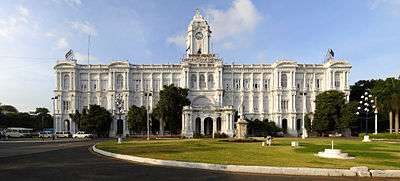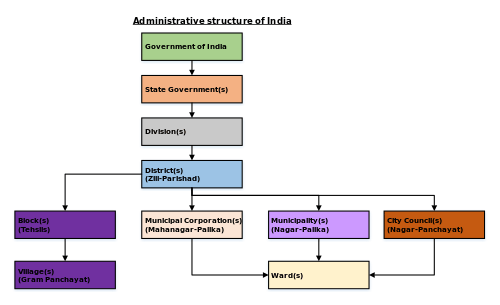Municipal Corporations in India
 |
| This article is part of a series on the politics and government of India |
|
|


A Municipal Corporation, City Corporation, Mahanagar Palika or Mahanagar Nigam is a local government in India that administers urban areas with a population of more than one million. The growing population and urbanization in various cities of India were in need of a local governing body that can work for providing necessary community services like health care, educational institution, housing, transport etc. by collecting property tax and fixed grant from the State Government.
The 74th Amendment made the provisions relating to urban local governments.[1]
Other names for Municipal Corporations
Municipal Corporations are referred to by different names in different states (due to regional language variations), all of which are translated to "Municipal Corporation" in English. These names include Nagar Nigam (in Delhi, Uttar Pradesh, Uttarakhand, Bihar, Rajasthan, and Haryana), Mahanagar Palika (in Goa, Karnataka, and Maharashtra), Pouro Nigom (in West Bengal),Pur Porishod (in Tripura), and Nagar Palika Nigam (in Madhya Pradesh).
The Vadodara Municipal Corporation is typically called by the name "Vadodara Mahanagar Seva Sadan". The detailed structure of these urban bodies varies from state to state, as per the laws passed by the state legislatures, but the basic structure and function is almost the same.
Composition

The area administered by a Municipal Corporation is known as a municipal area. Each municipal area is divided into territorial constituencies known as wards. A Municipal Corporation is made up of a Wards Committee. Each ward has one seat on the Wards Committee. Members are elected to the Wards Committee on the basis of adult franchise for a term of five years. These members are known as Councillors or Coporators. The number of wards in a municipal area is determined by the population of the city. Some seats are reserved for Scheduled Castes, Scheduled Tribes, backward classes and women.[1]
A State can choose to constitute additional Committees to carry functions of urban local governance, in addition to the Wards Committees. In addition to the Councillors elected from the wards, the legislature of a state may also choose to make provisions for the representation of persons having special knowledge or experience in municipal administration, the MPs or MLAs representing the constituencies which comprise wholly or partly the municipal area, and/or the Commissioners of additional committees that the State may have constituted. If a State legislature appoints a person from the first category to a Wards Committee, that individual will not have the right to vote in the meetings of the Municipal Corporation, while MPs, MLAs and Commissioners do have the right to vote in meetings.[1]
The largest corporations are in the six metropolitan cities of India, viz. Delhi, Mumbai, Kolkata, Chennai, Bangalore and Hyderabad. The Brihanmumbai Municipal Corporation (BMC) is the richest municipal corporation in India.[2][3]
Administration
The Mayor is the head of the Municipal Corporation, but the role is largely ceremonial as executive powers are vested in the Municipal Commissioner. The office of the Mayor combines a functional role of chairing the Corporation meeting as well as ceremonial role associated with being the First Citizen of the city. Per the amended Municipal Corporation Act of 1888, a Deputy Mayor is appointed by the Mayor. The tenure of the Mayor and Deputy Mayor is two and a half years.
Executive Officers monitor the implementation of all the programs related to planning and development of the corporation with the coordination of Mayor and Councilors.
Functions

The Twelfth Schedule to the Constitution lists the subjects that Municipal Corporations are responsible for. Corporations may be entrusted to perform functions and implement schemes including those in relation to the matters listed in the Twelfth Schedule.[1]
- Urban planning including town planning.
- Regulation of land-use and construction of buildings.
- Planning for economic and social development.
- Roads and bridges.
- Water supply for domestic, industrial and commercial purposes.
- Public health, sanitation conservancy and solid waste management.
- Fire services.
- Urban forestry, protection of the environment and promotion of ecological aspects.
- Safeguarding the interests of weaker sections of society, including the handicapped and mentally retarded.
- Slum improvement and upgradation.
- Urban poverty alleviation.
- Provision of urban amenities and facilities such as parks, gardens, playgrounds.
- Promotion of cultural, educational and aesthetic aspects.
- Burials and burial grounds; cremations, cremation grounds and electric crematoriums.
- Cattle pounds; prevention of cruelty to animals.
- Vital statistics including registration of births and deaths.
- Public amenities including street lighting, parking lots, bus stops and public conveniences.
- Regulation of slaughter houses and tanneries[1]
Sources of Income
Its sources of income are taxes on water, houses, markets, entertainment and vehicles paid by residents of the town and grants from the state government.
See also
References
- 1 2 3 4 5 "THE CONSTITUTION (AMENDMENT)". indiacode.nic.in. Retrieved 3 December 2016.
 This article incorporates text from this source, which is in the public domain.
This article incorporates text from this source, which is in the public domain. - ↑ "BMC to open green channel for octroi". Financialexpress.com. 2007-09-03. Retrieved 2010-08-25.
- ↑ "Gold & beautiful, News - Cover Story". Mumbai Mirror. Retrieved 2010-07-21.
